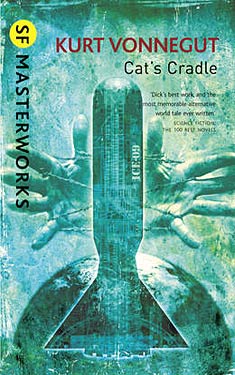Kurt Vonnegut Jr.
Completed 7/2/2018, Reviewed 7/2/2018
4 stars
Kurt Vonnegut has always been one of my favorite
authors. He writes in a very compact
style while infusing his work with the darkest of satire. This early work of his is no different. Told from a first-person point of view, he
recounts the events leading up to the end of the world by a weapon that freezes
water up to 114 degrees Fahrenheit. Both
easy to read and devastatingly funny, my eyes were continuously wide with
amazement at Vonnegut’s sardonic wit.
 Vonnegut tells the tale of a man trying to write a book
about the father of the atomic bomb. In
addition to the bomb, Felix Hoenikker also invented something called Ice-9, a
weapon that if released, would freeze all the water in the world. The narrator begins his research by
contacting the Hoenikker’s surviving children.
His journey leads him to the island of San Lorenzo, where he discovers
the eldest Hoenikker, Frank, is the right-hand man of the island’s dictator, “Papa”
Monzano. He also meets the other two
children there. Also on the island is
Bokonon, a man who created a religion to replace the Christianity that devasted
the place. Through a series of
improbably events, Ice-9 is released, ending the world as we know it.
Vonnegut tells the tale of a man trying to write a book
about the father of the atomic bomb. In
addition to the bomb, Felix Hoenikker also invented something called Ice-9, a
weapon that if released, would freeze all the water in the world. The narrator begins his research by
contacting the Hoenikker’s surviving children.
His journey leads him to the island of San Lorenzo, where he discovers
the eldest Hoenikker, Frank, is the right-hand man of the island’s dictator, “Papa”
Monzano. He also meets the other two
children there. Also on the island is
Bokonon, a man who created a religion to replace the Christianity that devasted
the place. Through a series of
improbably events, Ice-9 is released, ending the world as we know it.
Written over fifty years ago, the book has a cold war
feeling to it, even though it is not specifically about the cold war. It also has some recollections of WWII, which
Vonnegut took part in and was forever molded into an anti-war activist. Still, it is very relevant to today, citing
the stupidity of man in just about every character in the book.
What I liked best about the book is the narration. The unnamed narrator is very dry and very
aware. He listens to the self-involved people
around him, and rather than engaging, his main response to their ramblings is “Huh”,
emphasizing their self-absorbed delusions to the reader. Frank Hoenikker likes his style so much,
noting that he likes the “cut of his jib”, that he offers the narrator the island’s
presidency on the eve of “Papa’s” death.
The narrator never loses his cool until late in the book, with the first
small release of Ice-9.
As I mentioned before, the writing style is compact, yet it
is stuffed with satire on cold war Americans.
It makes for very easy reading and makes one appreciative of its terseness. Unlike a lot of the fantasy I’ve read lately,
there isn’t a whole lot of prose to complicate the dialogue. He gets right to
the point with the plot and characters.
The characters aside from the narrator are wonderfully one-dimensional,
very 1950s suburban blandness. They don’t
have to say much to give you an idea of how shallow they are. In a way, they reminded me of Salinger’s
Glass family from “Franny and Zooey” and other stories, in a word, narcissistic. As an introvert, it’s how I see most of the people
I come across in daily life. It made me
really identify with the narrator.
Vonnegut’s commentary on religion is also priceless. Two men, Bokonon and McCabe, create a
religion based on lies. McCabe, who
rules the island before “Papa”, sets up Bokonon as a traitor, because nothing spreads
a religion more than adversity. Bokonon basically
becomes a messiah and all the inhabitants become Bokononians.
The story is science fiction in its plot with Ice-9, but the
book is so much more than that. It is a
satire on humanity, revealing the banality of the average person in a world on the
brink of destruction. I give this book
four out of five stars.
No comments:
Post a Comment